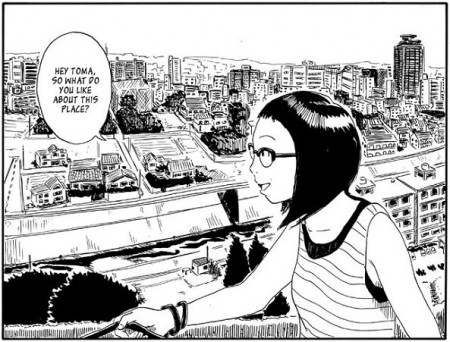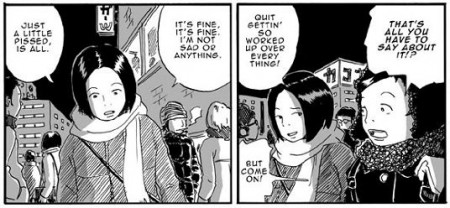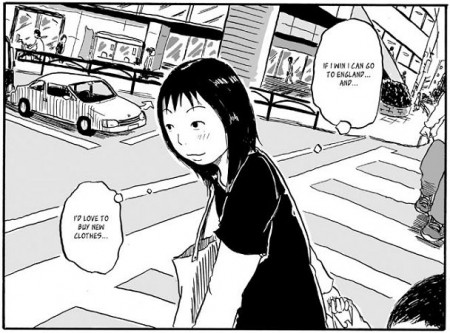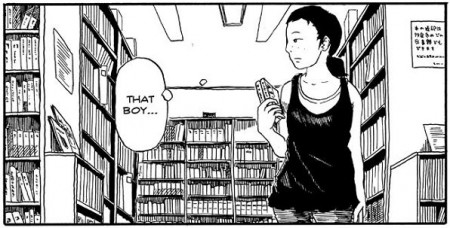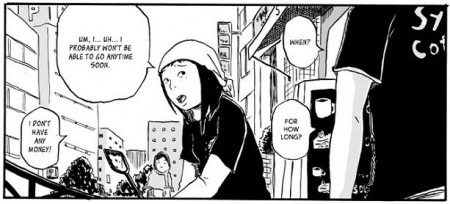Sorako is Stellar
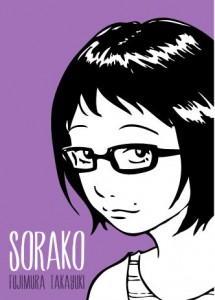
Having grown up as a geek during the 1980s, the Hernandez brothers’ independent slice-of-life comic book series Love and Rockets defined the offbeat, alternative, independent comic book in my mind. Since I grew up with America’s independent comic boom, I was also aware that indie comics featured belligerent anthropomorphic animals, ninja (of the female, fat, turtle, and high school varieties), all manner of criminals, hardboiled detectives, and much more. But twenty years later I still find my core definition of “indie comics” falling back on slice of life stories about the small existential anxieties of everyday life. So no title from GEN Manga’s stable better illustrates the translator’s canon of imported Japanese indie comics than Fujimura Takayuki’s deceptively simple routine life drama manga Sorako.
Fujimura Takayuki’s charming slice-of-life anthology Sorako depicts the ordinary lives of a selection of contemporary Japanese young women, single and married, capturing their amorphous sense of ennui and aimlessness. The manga’s title character appears in three of the manga’s seven chapters. Sorako is a typical girl on the cusp of adulthood, still living at home but already feeling the pressure to begin supporting herself. Her thick rimmed-glasses, often sloppy attire, and slight hunch all reveal her comfort with herself and her usual disinclination to conform herself to her society’s expectations for bright, positive, ambitious young women. Sorako lounges around, feels alienated from her father, worries about her lost dog, and wonders with mild anxiety what her future will be like. In other words, she’s an ordinary girl concerned more with being comfortable from day to day than with keeping up with social obligations or familial expectations. She unconsciously expects the world to come to her; she unknowingly awaits the day when she’ll suddenly be an adult when a new world of possibilities and wonders spreads out before her. It’s through small, gradual moments that Sorako comes to realize that it’s her own perspective alone that will identify wonderful opportunities. Her beloved lost dog suddenly reappearing in her life represents the fact that the only things that come to us are the things that we’ve invested our own love and effort into.
The symbolism in the “Birdcage and the Bystander” short story is both more overt and more powerful. Hatoko lives a routine life with a dull job and periodic gatherings with friends that seem almost as much a distraction as a pleasure. A spontaneous decision to rescue a broken birdcage from the trash sparks a small sense of spontaneity within Hatoko. “There may actually be things you can’t see looking in from the outside,” she realizes as she consciously decides to become an active participant in her own life instead of continuing to be just a passenger watching life pass by outside her window and allowing her friends to make decisions for her.
The short story about Tono-san, a coffee shop waitress whose bigger plans for life seem dauntingly impossible, unfolds as a charming, encouraging story about having hope but not depending on it. Tono-san dreams of one day studying abroad, but her goal seems more like a distant dream than a genuine possibility. Tono clings to that dream like a light at the end of a tunnel, a promise of one day discovering a bigger, more fascinating world than the small, local one she’s familiar with. She buys lottery tickets, secretly hoping to herself that a sudden stroke of luck will answer all of her prayers. But she also has a back-up plan: gradually but diligently working toward fulfilling her dream herself through work and devotion.
“A Boring Breakfast” revolves around a bored housewife whose daily routine with her husband has fallen into a wordless cycle. When she spies a lonely teen boy, she sees an opportunity to spice up her life. But rather than descend into lurid storytelling, author Takayuki’s pleasant short story instead reminds readers that a simple smile and congenial pleasantries can brighten someone’s day, and simple considerate acknowledgement in an unfeeling society filled with negativity goes a long way toward cheering someone up.
Somewhat comparable to Inio Asano’s acclaimed 2005-2006 slice-of-life manga story Solanin, Fujimura Takayuki’s independently published Sorako has a deliberately rougher, more natural art design than Inio Asano’s highly refined and precise line work. Takayuki’s spontaneous and looser art design compliments the manga story’s naturalistic, ordinary tone and belies the amount of subtle, revealing detail that fills the work. Small visual details like the objects that make up the clutter in Sorako’s room, passing traffic, and the expressions on the faces of bystanders all contribute to the theme of the manga that wonder and excitement aren’t distant, magical fantasies but rather potentials that lie hidden all around us. In order to strengthen the visual sense of ordinary daily realism, Takayuki breaks from typical manga conventions and excludes all visual sound effects, relying instead on character reactions and art design to evoke vibrancy and familiarity. Astute readers may also appreciate Takayuki’s amusing penchant for peppering the manga with playful background references to popular Western cult movies.
GEN Manga’s collection of Sorako includes the stories originally published in GEN Manga issues 4 and 7-10 along with an exclusive new chapter and a previously unpublished humorous two-page short story. The English language translations consistently sound natural and read fluidly. Japanese language text is left intact except when translation is necessary. In select cases Japanese text is translated via caption or overlay, selectively chosen to be the most effective and least obtrusive.
GEN Manga periodically sends me complimentary copies of its print books to review. I wasn’t sent a copy of the Sorako graphic novel. I purchased my own copy at retail price, and I’m very happy that I did so. Fujimura Takayuki’s Sorako is a quick read that seems simple and even superficial at first glance. But consideration and reflection reveal a substantial forethought and thematic substance to the book that makes Sorako affecting, charming, and periodically worth re-reading. Sorako is a personal favorite manga series of mine; I highly recommend it to readers that can appreciate and enjoy a quiet, realistic manga that satisfies with strong characterization and affirming symbolism in place of sensational, frenetic action and spectacle.
